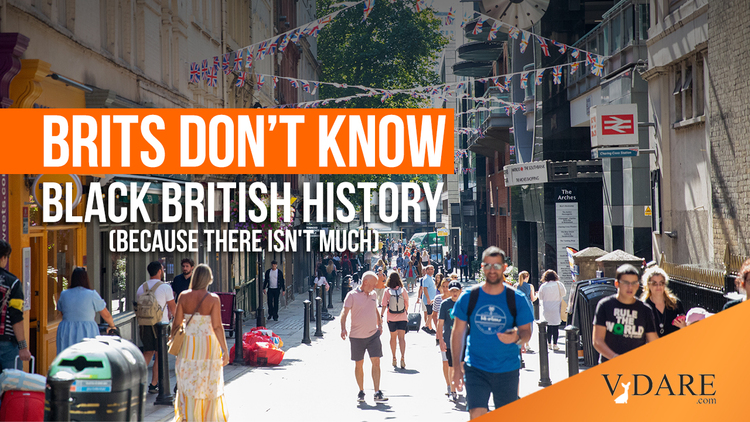
By Steve Sailer
10/27/2023
From The Guardian:
Half of Britons can’t name a Black British historical figure, survey finds
Exclusive: Majority of British people found to have ‘shockingly little’ knowledge about Black British history
Dalya Alberge
Thu 26 Oct 2023 00.00 EDT… more than half (53%) could not recall any Black British historical figures and only 7% could name more than four.
Although people with dark skin first came to Britain about 12,000 years ago, with the first known people to come directly from Africa settling approximately 2,000 years ago, more than a third (36%) of Britons surveyed believed that the first Black people migrated to Britain only in the past 200 years, with a further 29% not sure. …
She would have expected people to name figures such as Quintus Lollius Urbicus, who became governor of Roman Britain;

He was a Numidian Berber from Cirta (now Constantine) in modern Algeria, just inland from the Mediterranean.
the formerly enslaved Olaudah Equiano, who became an abolitionist and writer; Mary Seacole, who provided sustenance and care for British soldiers during the Crimean war, and the composer Samuel Coleridge-Taylor.
How many modern Brits can name that the author of “Kublai Khan” and “The Rime of the Ancient Mariner” was Samuel Taylor Coleridge?
OK, I could name at least one historic black Brit: Dame Shirley Bassey (born in 1937 in Cardiff and still alive today). As a child, I had a tape of her singing Goldfinger.
I saw another half-black Brit, Daley Thompson, win the Olympic decathlon at the L.A. Coliseum in 1984. Is that long ago enough to be historic?
In general, Britain doesn’t have as impressive a list of historical figures who were part black as France (Alexander Dumas, father and son) or Russia (General Gannibal, who was a clever African slave in the court of Peter the Great who became a general and a construction engineer, and his great-grandson Pushkin, the national poet).
In other black Brit news, from the Daily Mail:
By PIRIYANGA THIRUNIMALAN
PUBLISHED: 17:02 EDT, 25 October 2023
… The sign celebrating the 1,800-year-old remains of ‘Beachy Head Lady’ was taken down after scientific research revealed she was ‘most likely from Cyprus’.
The plaque was placed in an east Sussex village by BBC Two as part of their 2016 Black and British series where they billed the woman as the earliest ‘black Briton’, claiming she was of African origin. …
In the BBC programme, fronted by historian Prof David Olusoga, the Beachy Head Lady was presented as being of ‘sub-Saharan African’ origin, with a reconstruction of her features
The study, by the Crick Institute, found that while she grew up in Eastbourne, her origins were actually in ‘southern Europe — most likely Cyprus’.
This is a content archive of VDARE.com, which Letitia James forced off of the Internet using lawfare.